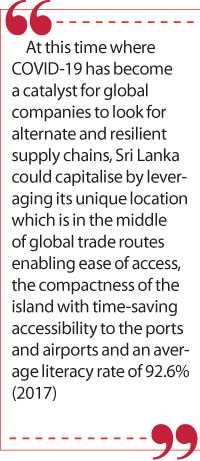Sunday Feb 15, 2026
Sunday Feb 15, 2026
Wednesday, 13 May 2020 00:00 - - {{hitsCtrl.values.hits}}

Companies in the US, EU and Japan are expected to move resources from the world’s second largest economy in a move to diversify. US-China trade tensions and retaliation fears also have added more fuel into this
By Udayani Shanmugavelu
There is a shift in global supply chains as a result of companies realising that large supply chains in China might have been economical, however the lessons from COVID-19 which resulted in prolonged supply-chain bottlenecks made them rethink. 
Companies in the US, EU and Japan are expected to move resources from the world’s second largest economy in a move to diversify. US-China trade tensions and retaliation fears also have added more fuel into this.
It is also believed that the pandemic will increase protectionism and will have a hit on globalisation. However, experts believe the fact that the countries that are better dealing with the health crisis (such as New Zealand, Australia, Taiwan, South Korea) are advocates of globalisation, and it’s a mere evolvement of globalisation we are about to witness.
India’s targeted investment pitch
India has stepped up its game to attract investments from companies looking for newer avenues and considering shifting from China. It is reported that in a Government-sponsored initiative a list of around 1,000 global companies has been prepared for investment pitches, covering sectors of electronics, automobile, capital goods, apparel, mining, renewables, metal, pharmaceuticals, medical equipment, and oil and gas.
Companies in the US, Japan, Germany, Taiwan, France, Middle East and overseas companies based in China with a strong export focus are targeted. Main parameters include balance sheet strength, supply chain expansion plans, presence of competitors in India and Government-to-Government relationship.
India expects to fast-track its reforms on land, labour and taxes, and has sought detailed feedback from US companies on changes needed to make the country conducive for companies. However, India faces tough challenges from Southeast Asia.
Vietnam: An economic success story in Southeast Asia
According to a study by Nomura, a Japanese Financial Group, out of 56 countries that relocated their production out of China between April 2018 and August 2019, 26 relocated to Vietnam, 11 to Taiwan, three to India and two to Indonesia.
When the 20-year war ended in 1975, Vietnam was one of the poorest countries in the world. A series of economic and political reforms lead the country to become a socialist-oriented market economy, with a GDP growth of 7%, and exports worth as much as its GDP (World Bank, 2018).
Vietnam’s growth is attributable to three main factors:
Trade liberalisation in the form of various trade agreements that Vietnam has entered which lowered the tariffs both on imports and exports
Domestic reforms reducing the administrative bureaucracy and cost of doing business
Heavy investments in human capital and infrastructure – predominantly in primary education and internet infrastructure, ensuring cheap mass access to the internet
By 2017, Vietnam became the largest apparel exporter in the region and second largest exporter of electronics (after Singapore) as per Financial Times.
Why Sri Lanka can’t let go of the opportunity
Post-pandemic, it is expected that there will be pressure on fiscal position of Sri Lanka with debt servicing in relation to International Sovereign Bond maturing in October. Savings on import bill due to oil price reduction and COVID-19 funds received will create some comfort, even though there will be detrimental effects of reduction in export earnings, foreign remittances and delayed tax revenue collection due to the crisis. This in turn will lead to lack of availability of funds for development.
At this time where COVID-19 has become a catalyst for global companies to look for alternate and resilient supply chains, Sri Lanka could capitalise by leveraging its unique location which is in the middle of global trade routes enabling ease of access, the compactness of the island with time-saving accessibility to the ports and airports and an average literacy rate of 92.6% (2017).
This can bring investments to Sri Lanka which can contribute to Sri Lanka’s COVID-19 Equity Fund, helping to revive businesses while creating new partnerships and drive innovation. These FDI’s can boost employment, economic growth by contributing to GDP, tax revenue and help foreign exchange reserves which will ease the servicing of foreign currency borrowings; which are the Government’s priorities while fighting the pandemic. The current political instability in the country due to delaying elections poses a detrimental effect on Sri Lanka’s attractiveness as a prospective alternative from an investor’s perspective. Sri Lanka needs promising reforms to improve the ease of doing business, which should be done in a transparent manner, by consulting relevant stakeholders and intellectuals.
It is also important that while both the investor and investee benefit, Sri Lanka needs to strategise the arrangement in a way that the knowledge in advance technologies, innovative ways of production, service provision and managerial strategies are shared, which enable the development of human capital.
This can then be fine-tuned to Sri Lankan context and replicated to other local firms, which in turn increase their productivity, competitiveness; which helps them to plug in to domestic and global value chains.
While COVID-19 is costing thousands of human lives every day, the capitalism-driven world doesn’t seem to pause. This compels Sri Lanka to make some tough decisions to revive the economy, as well as to keep people safe.